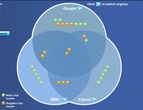StÈfan has a blog entry on Dogpile Search Comparitor tool which produces a venn diagram of the results from different search engines. The interface, however, has a fatal flaw. You can’t link to the resulting sites that are common to more than one search engine (and presumably are the ones you want). The little pills in the middle – which stand for the shared results link to a Dogpile listing, not to the resulting site itself.
Online Library Budgets
The Globe and Mail today had a section on Education with an article about A new world of digital libraries by Kate L. Barrette. The story quotes Michael Ridley, Chief Information Office and Chief Librarian at the University of Guelph to the effect that now they spend 63% of their acquisitions budget on digital resources (31% for print) compared to five years ago when it was 20% digital. That is a big change in the ratio of digital to print.
Continue reading Online Library Budgets
Globe and Mail: Layout Crazy
The paper I read every morning, The Globe and Mail has twice in the last week (today, Nov. 2, and Saturday past) had a highly designed front page focused on just one story. They are going “layout crazy” where they don’t present the news, but instead try to get attention. Why?
Continue reading Globe and Mail: Layout Crazy
Ubiquity: Why People Don’t Read Online
Wendell Piez pointed me to an article in Ubiquity: An ACM IT Magazine and Forum with the title Why People Don’t Read Online and What to do About It. It is by Michelle Cameron (Vol 6, Issue 40, Nov. 2-8, 2005) and is short and easy to read. It nicely summarizes the reasons people don’t read off the screen and how to write for those who scan. The last guideline is:
Know when to stop writing. Like now.
Banville, The Sea
Thanks to my colleague Joanne Buckley who buys hardcover novels, I just finished John Banville’s The Sea along with some of the others Booker nominees like Kazuo Ishiguro’s Never Let Me Go and Ian McEwan’s Saturday. Reviewers like Michiko Kakutani in A Wordy Widower With a Past – New York Times are dissappointed in the choice of The Sea for the Booker prize over the other candidates and I think they are wrong.
Never Let Me Go is a light, though well written, work of “speculative fiction” (which is what Atwood wants to call “science fiction” with pretentions to high literature. The premise is not original, but the unfolding of the lives of the children cloned for organ donation is elusively written. At the end of the day it is neither particularly interesting speculation or convincing human drama.
Saturday is gripping in the beginning, but then languishes. I found myself jumping to the end. McEwan is again trying to write a literary thriller and he doesn’t quite have it. Give me Le CarrÈ’s pacing over McEwan.
The Sea on the other hand has the carefully crafted prose of Ishiguro hauntingly tripped-up by deliberate undigestible images and words. Banville is trying to go beyond smooth poetic prose by inserting disturbing anachronisms and physically repugnant images. For those of us tired of stylistics there is much to think about in The Sea.
Further, Banville succeeds at revealing precisely that polished, culture conscious, and uninspired academic who woud value crafted prose. The narrator Max is dealing with the failure of all his poise to make meaningful relationships in the face of death. Without being banal, Banville plots an educated man’s reflections simultaneously on when he came of age with his coming to terms with failed age. These reflections combine the petulant pedantry that comes with failure with a remained nose for the smell of others. A novel that will leave you flat and depressed for a weekend, but won’t leave you.
Buckets of Grewal: Again

In June I blogged a friend’s blog called Buckets of Grewal which is about the Grewal affair. (See the original post here, and at the The HUMlab blog). I note today that the Buckets blog has now surpassed Gurmant Grewal’s site, if you google “Grewal”, but not his wife Nina’s site. Also, this only works on the google.ca site.
Buckets says, “A rose between two thorns.” Or is it a bucket between two gruels.
Serious Games
In a previous blog entry I linked to a conference on Serious Games. Last week I was interviewd by Bob Greiner of the Washington Post for a story titled, Game Industry Finds Serious Outlet for Creative Energies. The article is quite good. Greiner has written an in-depth article looking at the opportunities for gaming in education.
What Blogs are Not
Terry Flynn, who is an industry prof at McMaster in communications management pointed me to an article, What Blogs are Not by Kate Trgovac that reports on a talk by that title given by David Weinberger at the BlogOn conference.
The approach of what blogs are not (as in, they are not journalism) works well.
A National Dialogue on Higher Education
The Canadian Federation for the Humanities and Social Sciences is sponsoring a National Dialogue on Higher Education in November in Ottawa.
How is it a dialogue? They have an online forum and at the conference there will be “Table Talk” sessions at meals. There has also been a lot of discussion behind the scenes between the organizations sponsoring this. I can’t help feeling, however, that some of this is about promoting higher education outside the academy.
Continue reading A National Dialogue on Higher Education
Stanford Podcasting and iTunes
Stanford iTunes is a site that will launch your iTunes so that it sees podcasts from Stanford University organized as a podcast “store”. In effect Apple gave Stanford a section of the iTunes store with its own graphics, “What’s New” section and subsections. Very interesting way to promote academic content (and the university) by being able to manage ones own area. I wonder how it works under the hood, and if Apple will let anyone create an iTunes site? From the FAQ I note that the tunes are not kept on the Apple iTunes site, but on Stanford’s server, and that therefore searching iTunes won’t work. This is thanks Peter Sutherland.

